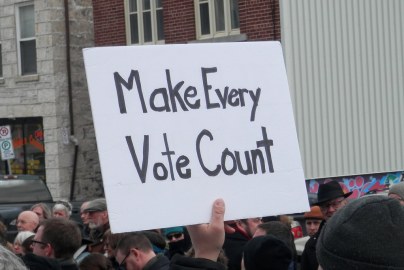 The sense of injustice in the way we elect our politicians and the unwarranted power which a select few are able to wield has never been higher in modern times. On 13th December, the day after the 2019 General Election, the Electoral Reform Society published its assessment that a depressing 45% of all votes cast had no impact at all on the outcome of the election.
The sense of injustice in the way we elect our politicians and the unwarranted power which a select few are able to wield has never been higher in modern times. On 13th December, the day after the 2019 General Election, the Electoral Reform Society published its assessment that a depressing 45% of all votes cast had no impact at all on the outcome of the election.
This in a country which, with no sense of irony, claims to possess the ‘Mother of all Parliaments’!
The fact that electoral systems are closely bound with socio-economic problems was brought into focus during the Brexit vote which some voters viewed as an opportunity to express their disaffection and duly registered a protest vote.
But a multifaceted issue such as Brexit was never going to fit into the artificial binary in/out framework of a referendum. The consequence has been years of stagnation, wrangling and a deeply divided and unstable society.
Political Equality
Although no electoral system can deliver a perfectly fair result, there is a deeper question to be asked about the practical outcome of political equality. The right to a vote means the right to influence public policy which in turn means the right to have a say in Government. This right lies at the foundation of a free society. But a society is only genuinely free if it does not fall into the hands of a small class or group who rule for their own good.
The problem is brought into sharp focus if we take a glance at the history of elections since they took an identifiably modern form in 1928. Amazingly, last time any political party gained over 50% of the vote was just three years later in 1931 – almost 90 YEARS AGO!
This means that the present Conservative Party forms a minority Government. Likewise, the main opposition Labour Party is a minority party. But no party with minority support should be allowed to govern us as a matter of legitimacy!
As with the Brexit referendum our First Past The Post system effectively crams a multitude of political approaches into a binary two-party outcome. The result is the appalling spectacle of ‘tactical voting’ where electors are coerced into voting for a suboptimal parliamentary candidate just to try and prevent the election of a candidate they fear or despise.
There is an understandable sense of hopelessness and alienation which was described by Willie Sullivan, Senior Director of the Electoral Reform Society:
People will not tolerate being systematically ignored. This has to be the last election under Westminster’s warped voting system
Reform Blocked by Misplaced Entitlement
The demand for reform and control of our Government has been ongoing for centuries. The 19th Century Chartist demand for electoral reform was an integral part of the demand for overall socio-economic reform to alleviate deprivation and oppression suffered by the majority of working people. Chartists confronted an industrial economy trapped within an aristocratic state.
Today we have a low-wage service and knowledge economy trapped within an oligarchic state and herein lies the problem.
At its root lies a sense of entitlement held by both the main political parties. The Conservatives, with a view of society where social inequality is inbuilt, will not consider power sharing with the risk that their advantage will slip away.
The Labour Party has until now benefited from the system and claims title to all radical and social justice impulses opposing the oligarchic wielding of power. Consequently, they do not see why they should share opposition with other groups. Now, as then, the fact that political reform and social reform are linked provides the reason why Proportional Representation has proved so hard to enact in our time.
I totally agree with you, and another matter at further risk is Human Rights being eroded. As the U.N. have ‘complained’ the U.K. is the worst of industrialised nations for its institutional child abuse. What victim of the Radford identified eleven million has been adequately compensated ? None. Some have had pennies to keep them quiet, when the truth is all should receive significant compensation. That is just one example of the British government not respecting its international legal duty.
LikeLiked by 1 person
Thank you for your comment. Yes, indeed, Human Rights is one of the casualties of our system. It is being made worse by the increasing power of the Government over Parliament resulting in reduced capability of holding Ministers to account. Your point about abuse is a fair one, Internationally, there is also the case of the Chagos Islanders who were denied a judicial review by David Miliban’s use of the autocratic Royal Prerogative when he was Foreign Secretary. Depressingly I think we will make little progress until there is a more profound change in our constitution which goes way beyond even electoral reform.
LikeLike